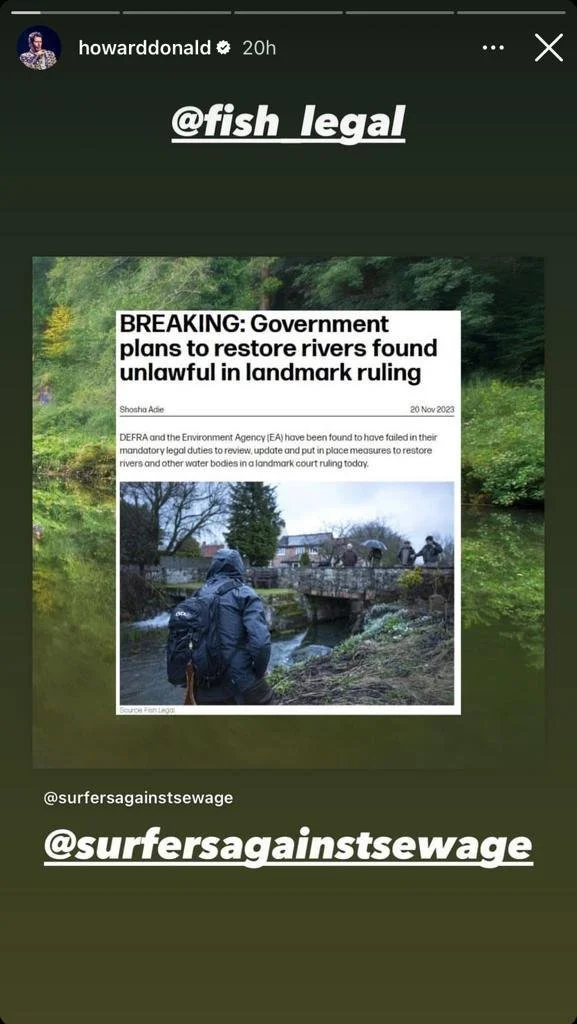Landmark Ruling for our Rivers
A Yorkshire angling club fighting to restore Upper Costa Beck, a formerly prime trout and grayling fishery near Pickering now degraded by pollution - working with environmental organisation Fish Legal - have won a landmark judicial review in the High Court against the Government and the Environment Agency of its defective river improvement plans.
In a judgment released by the Court today [20 November], Mrs Justice Lieven ruled that the Government, and the Environment Agency, had failed in their mandatory legal duties to review, update and put in place measures to restore rivers and other water bodies under the Water Framework Directive Regulations.
Fish Legal, acting on behalf of the Pickering Fishery Association, brought a legal challenge to the government’s deficient River Basin Management Plan for the Humber district, as signed off by the Secretary of State for Environment, Food and Rural Affairs (DEFRA) and published in December 2022. The angling club argued that the plan, which comprised wholly generic or yet to be formulated steps, lacked the legally required measures necessary to restore the Upper Costa Beck, such as review and tightening of inadequate discharge permits and other authorisations to tackle the root causes of the fish failure (which for example included recurrent sewage spills from a sewage treatment works numbering as high as 761 sewage spills in a year).
The case was heard over 2 days at the Royal Courts of Justice on 12 and 13 July. In a damning judgment, believed to be the most significant UK Court ruling on the Water Framework Directive since the river basin planning process commenced in 2003, the Court found for the angling club on each of its argued grounds.
Draft river basin management plans published by the Environment Agency in autumn 2021 included ‘summary programmes’ of measures supposedly intended to restore all waterbodies in each of the 10 river basin management districts in England ahead of the legally binding final target date for achievement of the environmental objectives of December 2027. However, the Court found that the fundamental requirement to assess and identify specific measures to achieve the mandatory targets for each waterbody - such as tightened environmental permits for controlling sewage pollution - had unlawfully not been discharged. Mrs Justice Lieven characterised the Secretary of State’s approach as one of “smoke and mirrors”, noting the acceptance before the Court that there was no evidence that the programme of measures could reasonably be expected to achieve the environmental objectives. As the angling club argued, the Secretary State was in effect planning to fail and her approach robbed this key legal regime of meaningful effect.
The Court also found the public consultation process undertaken by the Environment Agency to be unlawful because it failed to provide the necessary information for anglers on the Upper Costa Beck to understand what action was being proposed to address the reasons for the fish failure and therefore defeated their right to participate and contribute to the river planning process.
Andrew Kelton, Fish Legal Solicitor, said: “This case goes to the heart of why Government has failed to make progress towards improving the health of rivers and lakes in England. Only 16% of waterbodies - 14% of rivers - are currently achieving ‘good ecological status’, with no improvement for at least a decade, which comes as no surprise to us having seen how the Environment Agency at first proposed, but then for some reason failed to follow through with the tough action needed against polluters in this case. The Upper Costa Beck is just one of 4,929 waterbodies, but it is a case study in regulatory inaction in the face of evidence of declining river health.”
He added: “The Environment Agency and the Government have taken a high-level, generic – and effectively non-committal – approach to the mandatory targets when what was needed was a waterbody-by-waterbody plan of real, committed action. We hope this ruling will lead to widespread implementation of actual, on-the-ground improvements, not only on the Costa Beck but on every other ‘failing’ river and lake across the country.”
Penelope Gane, Head of Practice at Fish Legal, said: “The environmental objectives and information in river basin management plans underpin all sorts of long-term statutory plans and other strategic planning, including the Government’s Plan for Water, water company business plans, water resources regional plans and the chalkstream restoration strategy. This legal action exposes that all of those policies and plans are effectively built on foundations of sand.”
She added: “While we are celebrating our legal victory today, we now have to go back to Court to argue over remedies. As you can imagine, the Government is desperate to limit the fall-out from a legal ruling with such potentially far-reaching implications. This is a chance for the new Secretary of State to show a real commitment to restoring rivers and lakes. What we need are River Basin Management Plans backed by meaningful action. Anything short of that will be a tacit admission that the Government has abandoned its environmental ambitions for water.”
Since the news broke, there has been a momentous movement across all media, with some highlights outlined below. Our community continue to spread the word and hope this leads to widespread change for the health of our rivers.
The Guardian
The Times
Nearly two thirds of popular swimming spots on English rivers ‘unsafe’ (thetimes.co.uk)
ENDS Report
Government plans to restore rivers found unlawful in landmark ruling (endsreport.com)
Social Media:



